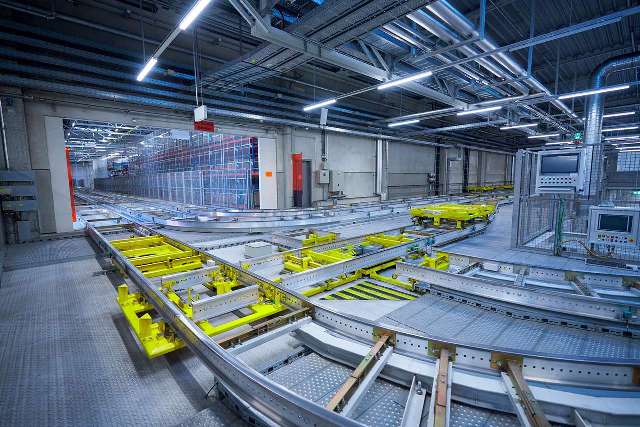
BMW vehicle’s entire value chain reducing CO2 emissions
More sustainable logistics at the BMW Group
The BMW Group has set itself a very clear milestone: to reduce CO2 emissions throughout a vehicle’s entire value chain, from resources to recycling, by 40 percent from 2019 levels by 2030. This ambitious goal requires closely examining a vehicle’s entire lifecycle and identifying potential for lowering emissions. Logistics plays an important role in a vehicle’s value chain. It seamlessly and precisely connects all players involved in the supply and production process via a variety of transport routes. CO2 emissions are produced throughout this process: on plant grounds (intralogistics), as a result of supplying plants with parts and from shipping the finished vehicles for worldwide distribution (upstream and downstream transport logistics). Karl-Friedrich Koch is responsible for all logistics planning at the BMW Group: “Logistics is definitely a relevant lever for reducing the BMW Group’s environmental footprint, also when considering the entire vehicle lifecycle.”
Technological innovations are needed for low-emission drive trains and resource-efficient packaging for global logistics. In recent years, the BMW Group has launched a variety of activities in these areas. Research and pilot projects, collaborations with service providers in its partner network and the principle of open technology are all part of these efforts. The BMW iFACTORY. LEAN. GREEN. DIGITAL. provides an overarching strategic vision for the global production network – and therefore also for logistics. Flexibility, efficiency, sustainability and digitalisation are key to all processes.
Green hydrogen as the fuel of the future
Since the transport of goods will remain unavoidable in the future, using innovative, sustainable drive technologies for long distances is a central task. To this end, the BMW Group adopts a technology-open approach. The BMW Group believes hydrogen has great potential as a fuel and is engaged in intensive research in this area. Hydrogen is a promising energy source, due, among other factors, to its short filling time, versatility and attractive range. Green hydrogen, produced from renewable energies, should be prioritised. Plant Leipzig is a trailblazer in this respect, pursuing two research projects. Sustainability is deeply rooted in the plant structure and taken into account during the planning stage.
The aim of the “H2Haul” European research project is to develop and pilot electric fuel cell trucks. The scope of the German project includes two fuel cell trucks, which the BMW Group intends to use to transport goods between Plant Leipzig and Nuremberg. As the consortium leader of the second research project, “HyCET”, the BMW Group is directing development and testing of trucks with hydrogen combustion engines, with the aim of demonstrating their potential for transport logistics. The other issue for HyCET, alongside tec
Information Source: Read More “
Energy Monitors , Electric Power , Natural Gas , Oil , Climate , Renewable , Wind , Transition , LPG , Solar , Electric , Biomass , Sustainability , Oil Price , Electric Vehicles,


